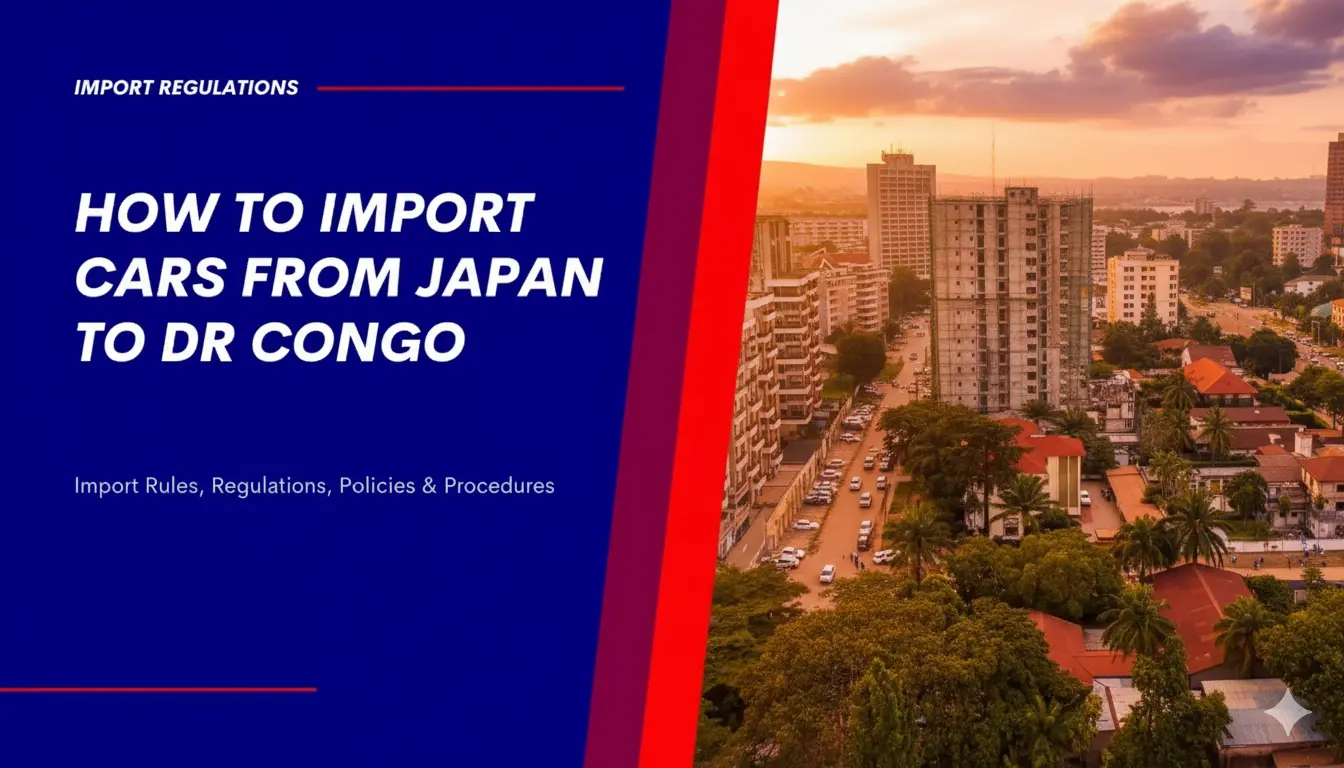
The Democratic Republic of Congo (DRC) is a growing market for used cars imported from Japan due to the quality and affordability of Japanese vehicles. However, importing cars into the DRC requires adherence to various rules and regulations, including import duties, vehicle inspections, and other specific requirements. This guide outlines the process, regulations, and procedures for successfully importing used cars from Japan into the DRC.
Import Rules and Regulations
Vehicle Age Limit
The DRC imposes restrictions on the age of vehicles that can be imported to ensure road safety and reduce environmental impact. While specific age limits can vary depending on government policies at the time, in general, vehicles should not exceed 10 years from the date of manufacture. Importing vehicles older than this may result in higher duties or restrictions, so it’s essential to confirm the age requirements before purchase.
Pre-Shipment Inspection (PSI)
Vehicles imported into the DRC must undergo pre-shipment inspection (PSI) before leaving Japan. This inspection is conducted by authorized agencies, such as the Japan Export Vehicle Inspection Center (JEVIC), to ensure that the vehicle meets Congolese standards for safety and roadworthiness.
Key elements of the inspection include:
- Odometer verification
- Emissions testing
- Structural safety check
- General mechanical condition
The inspection certificate must be submitted upon the vehicle’s arrival in the DRC. Failure to present a valid inspection certificate may result in fines or refusal of entry for the vehicle.
Import Duties and Taxes
When importing a vehicle to the DRC, several duties and taxes apply. These are calculated based on the Cost, Insurance, and Freight (CIF) value of the vehicle:
- Customs Duty: Ranges from 8% to 40% of the CIF value, depending on the vehicle type, engine size, and year of manufacture.
- Value Added Tax (VAT): A standard 16% VAT is applied on the total value of the vehicle, including the customs duty.
- Excise Duty: Applied to luxury or large-engine vehicles, with rates varying based on engine capacity and the age of the vehicle.
- Consumption Tax: Varies depending on the type and engine capacity of the vehicle.
These taxes and fees should be factored into the overall cost of importing a vehicle, as they can significantly affect the final price.
Vehicle Prohibition Policies
While there are no general prohibitions on importing used cars, the DRC does restrict vehicles that do not meet environmental or road safety standards. Importers must ensure that the vehicle adheres to local regulations, including limits on emissions and safety features. Vehicles that fail to meet these standards may be rejected at the port of entry.
Procedures for Importing Cars
Step 1: Choose a Vehicle and Verify Compliance
Before purchasing a vehicle in Japan, it’s essential to confirm that it meets the DRC’s import regulations, including the age limit and roadworthiness standards. Select a reputable exporter or auction site to ensure that the vehicle’s history and condition are accurate.
Step 2: Arrange for Pre-Shipment Inspection
Once a vehicle is selected, schedule the mandatory pre-shipment inspection (PSI) through an authorized inspection agency like JEVIC. This inspection must be completed before the vehicle is shipped from Japan to the DRC. The inspection certificate will be required during customs clearance.
Step 3: Shipping and Documentation
Arrange for shipping to a port in the DRC, typically Port of Matadi or Boma Port. Ensure that all documentation is complete and correct, including:
- Bill of Lading (BOL): The shipping document detailing the vehicle’s transport.
- Commercial Invoice: Proof of the vehicle’s purchase price.
- Pre-Shipment Inspection (PSI) Certificate: Verification that the vehicle has passed the mandatory inspection.
- Import Declaration Form (IDF): This form must be completed and submitted to customs for clearance.
Step 4: Customs Clearance and Payment of Duties
Once the vehicle arrives at port, it must go through customs clearance. The importer is required to submit all necessary documentation and pay the relevant duties and taxes. Customs authorities will assess the vehicle based on its CIF value, and all import duties, VAT, and other applicable taxes must be paid before the vehicle is released.
Step 5: Vehicle Registration
After the vehicle has cleared customs, it must be registered with the relevant authorities in the DRC to be legally driven on the road. This includes obtaining local number plates and a logbook. Additional inspections may be required to ensure the vehicle is compliant with local safety and environmental standards before registration is completed.
Key Considerations for Importing Cars
Import Costs
Importing a vehicle into the DRC can involve significant costs beyond just the purchase price. Taxes, import duties, shipping fees, and potential costs for compliance modifications should all be factored in when budgeting for the import process.
Environmental and Safety Standards
The DRC is increasingly focused on environmental and safety regulations, particularly for imported vehicles. Ensuring that the vehicle meets the required emissions standards and passes the pre-shipment inspection is critical for a smooth import process. Vehicles that fail to meet these standards can incur additional fines or be refused entry.
Used Car Demand in the DRC
Japanese used cars are popular in the DRC due to their affordability and durability, especially for navigating the country’s diverse and challenging terrain. Popular models include:
- Toyota: Known for its reliability and off-road capabilities, especially the Toyota Land Cruiser and Hilux.
- Nissan: Models like the Nissan Patrol and X-Trail are common imports due to their durability.
- Mitsubishi: The Mitsubishi Pajero is popular for both urban and rural driving conditions.
These vehicles are favored for their robust build and suitability for both urban commuting and off-road use.
Conclusion
Importing a car from Japan to the Democratic Republic of Congo can be a rewarding endeavor for individuals and businesses looking for affordable, reliable vehicles. However, the process involves several regulations, inspections, and duties that must be carefully followed to ensure compliance with local laws. By adhering to the DRC’s import rules, securing the necessary inspections, and ensuring proper documentation, importers can successfully bring in high-quality vehicles from Japan.

